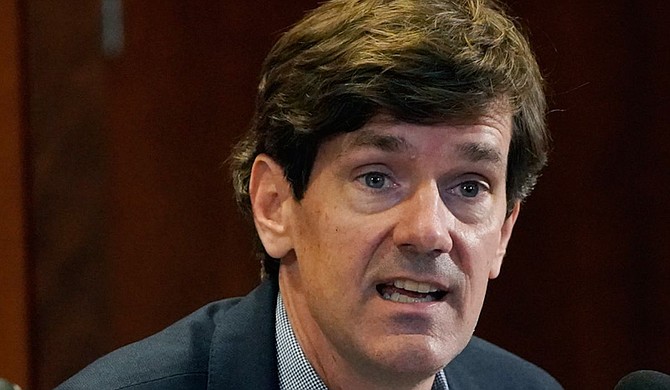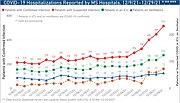Cases are on the rise, with more than 13,000 new reports from the Mississippi State Department of Health since Dec. 22. Hospitalizations and intensive-care intakes are up as well, with more expected in coming weeks. Photo by Rogelio V. Solis / Associated Press
Leadership among the Mississippi State Department of Health warned that the fifth wave of coronavirus is here, with more than 13,000 new cases of COVID-19 identified since Dec. 22, the majority of which consist of the highly contagious omicron variant.
“For the weekend ending Dec. 25, the majority of our cases are now omicron,” MSDH Director of Communications Liz Sharlot said in a Dec. 30 press conference.
“In all parts of the state, we really are in the fifth wave now of COVID-19 for Mississippi,” State Epidemiologist Dr. Paul Byers said.
As of Wednesday, 514 patients were hospitalized with COVID-19, a marked increase from earlier weeks. Patients Intensive-care units were up as well, with MSDH noting 123 ICU patients in the latest report.
As cases and hospitalizations climb over the winter, that strain on healthcare infrastructure could come on top of already stressed healthcare workers, as insufficient staffing is leading to difficulty maintaining full patient capacities.
“It is becoming increasingly difficult for our smaller community, county hospitals to transport smaller-community patients to some of our larger centers,” MSDH Senior Deputy Jim Craig said.
Craig noted that Mississippi is not immune to nation-wide healthcare worker shortages.
“The reports from that are mainly due to a lack of staff beds in some of those hospitals, but it all plays back to that staffing issue,” Craig said. “We have got a staffing shortage in this nation, and it's here in Mississippi as well.”
State Health Officer Thomas Dobbs noted that omicron appears to be less deadly than the delta variant, but that the large increase in the rate of cases potentially means more deaths in total.
“It does appear to cause less severe illness, but regardless we will continue to see additional hospitalizations and deaths, many of which could be avoided,” Dobbs said.
Dobbs also spoke on the recent shortage of monoclonal antibody treatments, noting that MSDH is working to get more doses to hospitals.
“We're trying to deploy them as quickly as we can,” Dobbs said. “Most of the monoclonal treatments that we have are not effective against the omicron variant so it's important to prevent getting COVID-19 right now while we're awaiting additional doses of the oral antivirals."
Jackson Mayor Chokwe. A Lumumba recently issued an executive order closing city hall, as well as any non-essential city buildings.
“The infectious spread of COVID-19 through both the delta and omicron variants has continued and dramatically increased in the City of Jackson,” reads Lumumba’s press statement. “With a corresponding increase in hospitalizations and death rates … the City of Jackson does not have the luxury of a wait-and-see approach to the continued threat.”
Email Reporting Fellow Julian Mills at [email protected].




Comments
Use the comment form below to begin a discussion about this content.
comments powered by Disqus